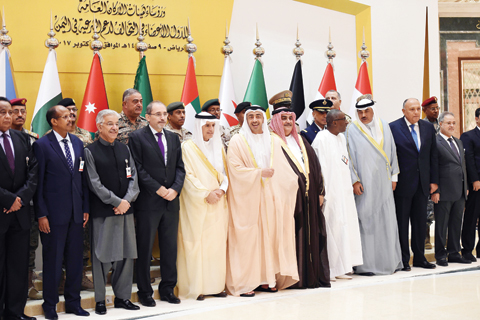Qatar emir warns against military action in Gulf dispute
 RIYADH: Attendees pose for a group picture following a meeting between foreign ministers and military officials from the Saudi-led coalition yesterday. - AFP
RIYADH: Attendees pose for a group picture following a meeting between foreign ministers and military officials from the Saudi-led coalition yesterday. - AFP
RIYADH: Saudi Arabia yesterday accused Iran of blocking peace efforts in Yemen, slamming its political archrival over its support for rebels which Saudi-led forces are battling in Yemen. Saudi Foreign Minister Adel Al-Jubeir accused Tehran of smuggling arms to Yemen's Shiite Houthi rebels, who control the capital Sanaa and northern Yemen, and to the rebels' ally former president Ali Abdullah Saleh.
"Iran is destroying all attempts to find a solution in Yemen, which has led to the failure of all political negotiations between the government and these militias," Jubeir said in Riyadh. He was addressing a meeting of foreign ministers and military officials from countries, including Egypt, Bahrain and the United Arab Emirates, which are part of the Saudi-led coalition involved in Yemen. "These militias would not have continued operations without the support of the greatest sponsor of terrorism in the world - the Iranian regime," Jubeir said.
While Iran does not hide its support for the rebels' cause, it has consistently denied smuggling arms to the Houthis. Yemeni Foreign Minister Abdulmalik Al-Mekhlafi told the meeting the Houthis were carrying out a "sectarian project inspired by Iran" which he said sought to "topple the legitimate (Yemeni) government". The Yemen war has claimed more than 8,600 lives since a regional military coalition, led by Saudi Arabia, joined the Yemeni government's fight against the rebels in 2015.
A cholera outbreak has also claimed more than 2,100 lives since April as hospitals struggle to secure supplies amid a blockades on ports and the country's main international airport. The United Nations has warned Yemen now stands at the brink of famine. Multiple rounds of UN-sponsored talks on the Yemen war have failed to broker a political settlement between the Saudi-backed government of Abedrabbo Mansour Hadi and the rebels and their allies.
Addressing yesterday's gathering, Saudi chief of staff, General Abdel Rahman bin Saleh Al-Banyan, said Yemeni forces had regained control of "85 percent of the country" and had "spared civilians in conformity with international humanitarian law". The meeting comes a week after US Secretary of State Rex Tillerson met with Gulf officials in the Saudi capital for talks that largely focused on Iran's role across the region.
Meanwhile, Qatar's emir has warned against any military confrontation over the ongoing diplomatic dispute between his country and four other Arab nations, saying it would only plunge the region into chaos. Sheikh Tamim bin Hamad Al-Thani said US President Donald Trump has offered to host a meeting between Qatar and its opponents - Bahrain, Egypt, Saudi Arabia and the United Arab Emirates - to end the crisis between the American allies.
Speaking to the American television network CBS's "60 Minutes" news program, Sheikh Tamim said so far, however, there's been no response from the boycotting nations. "It was supposed to be very soon, this meeting," he said. The threat of a military confrontation between the countries loomed in the initial days following the start of boycott on June 5. Arabic language media in the boycotting nations suggested the need for a "Peninsula Shield" operation, which is the military arm of the Gulf Cooperation Council, though government officials downplayed the idea at the time. Saudi and UAE forces attached to Peninsula Shield previously deployed into Bahrain to put down its 2011 Arab Spring protests.
When meeting in Washington with Trump in September, Kuwaiti Amir HH Sheikh Sabah Al-Ahmad Al-Jaber Al-Sabah said that mediation by the American president helped avoid any violence. "Thank God, now, what is important is that we have stopped any military action," said Sheikh Sabah, who himself has been trying to mediate the dispute. In the "60 Minutes" interview, which aired yesterday night in the US, Sheikh Tamim acknowledged the alleged military threat. "I'm fearful that if anything happens, if any military act happens, this region will be in chaos," he said.
His comments drew immediate criticism early yesterday from Emirati Minister of State for International Affairs Anwar Gargash. "To go to the Western media and attack Saudi Arabia and the United Arab Emirates at this point is desperate," Gargash wrote on Twitter. Qatar "should accept its isolation without sniveling and do what it must." The four countries boycotting Qatar allege the natural gas-rich nation funds extremists, and are opposed to its support for Islamist opposition groups and ties to Iran, with which it shares a massive gas field. Doha long has denied funding extremists. - Agencies




